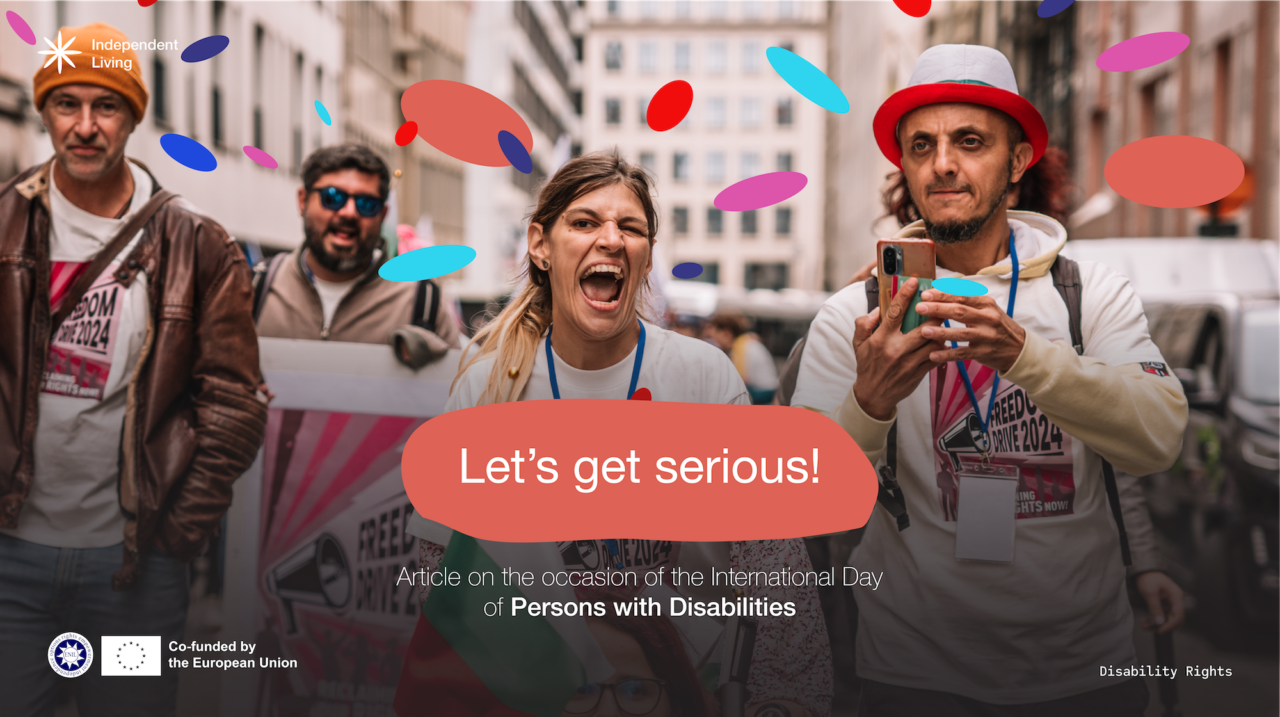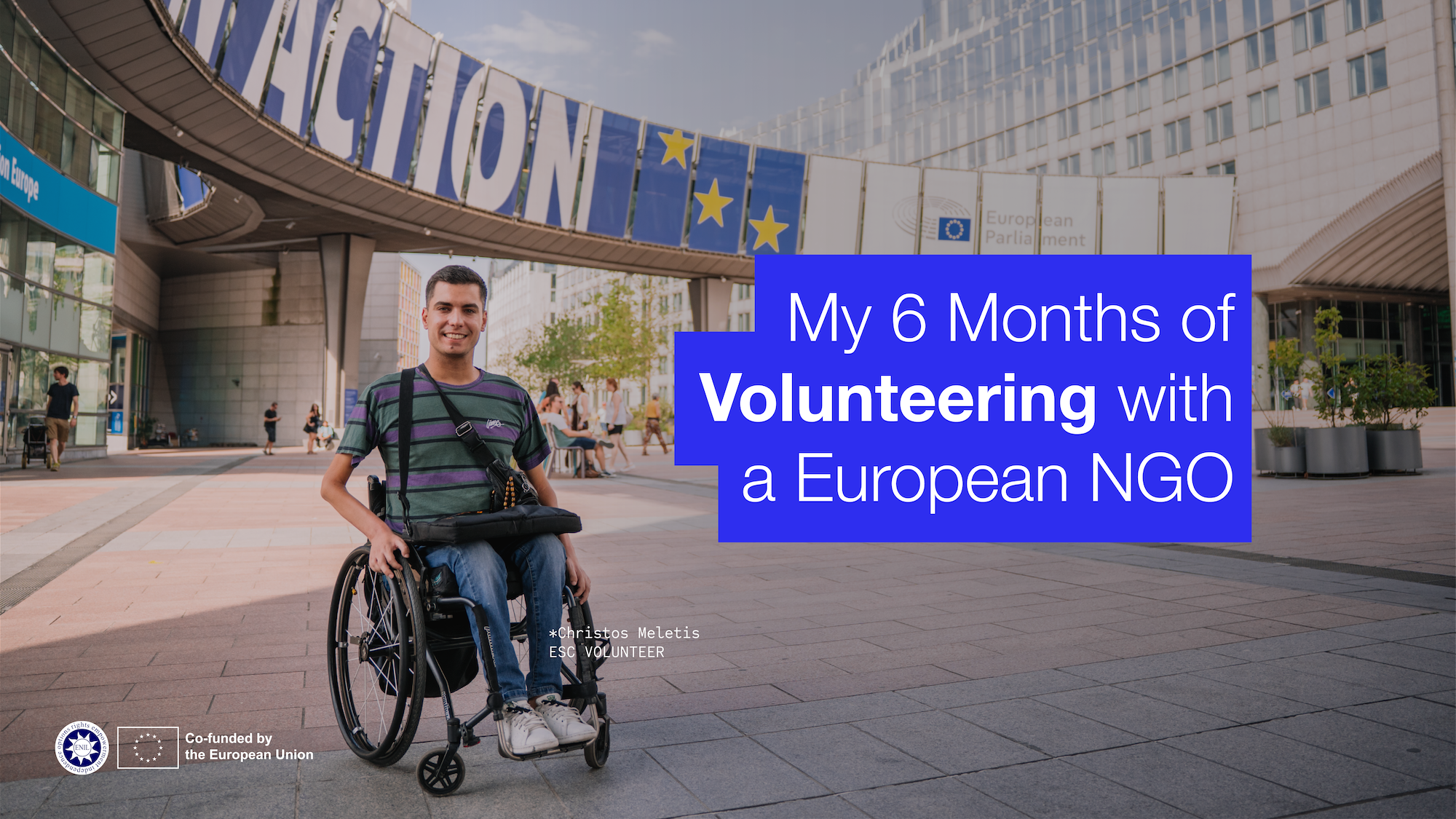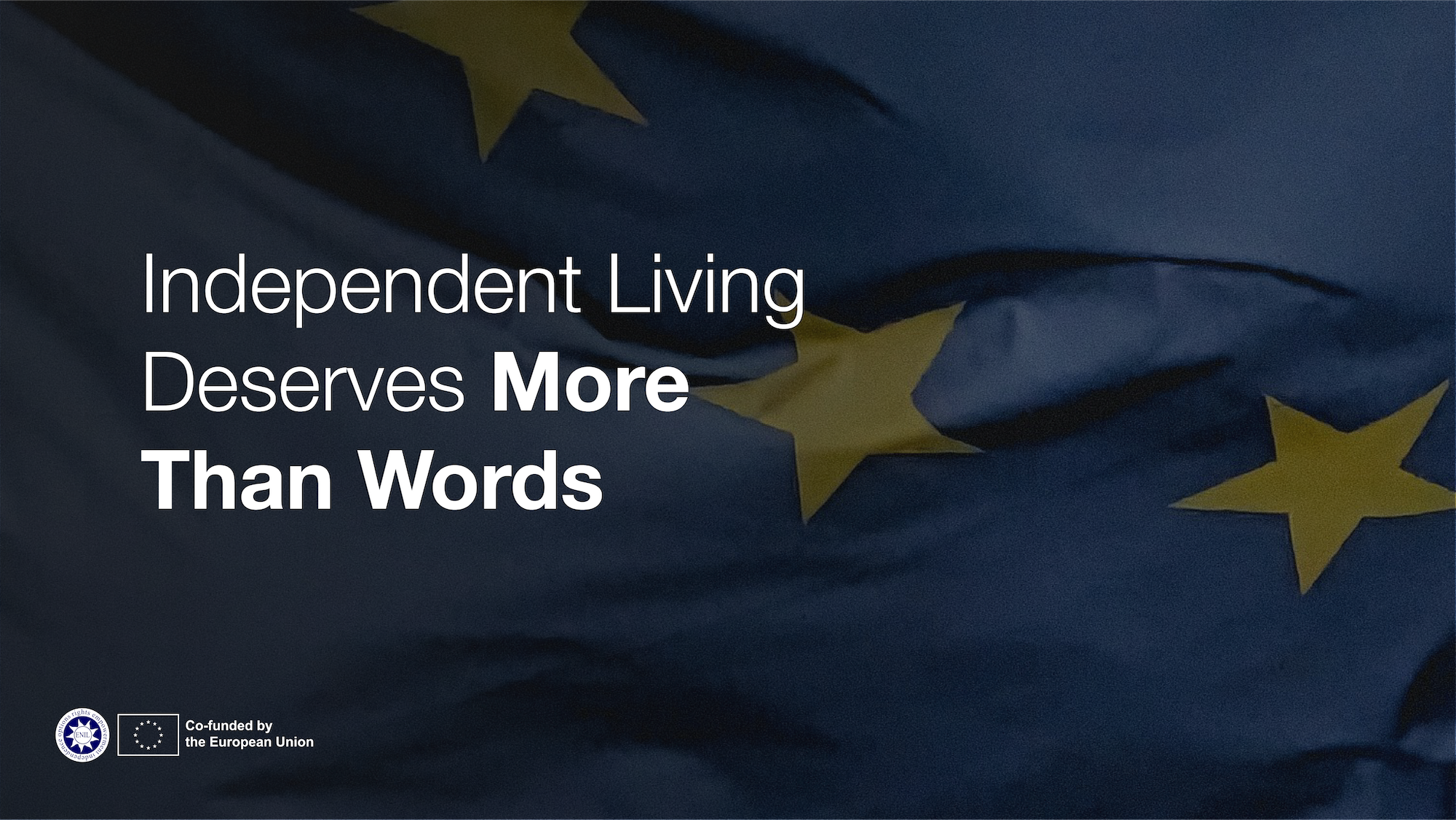Concrete initiatives needed under the European Strategy on the Rights of Persons with Disabilities 2021 – 2030
In Brussels, 3 December 2024 – The European Network on Independent Living is concerned about the lack of progress and backsliding when it comes to the rights of disabled people in Europe. We call on all stakeholders to cease protecting the status quo and instead fight for true change, which can only come from reforms in laws and policies, and their subsequent implementation. On the occasion of the International Day of Persons with Disabilities, we call on the European Commission to include ambitious new initiatives under the second part European Strategy on the Rights of Persons with Disabilities 2021 – 2030.
ENIL would like to propose the following flagship initiatives:
1. Directive on personal budgets
ENIL is calling for a directive on personal budgets, which would ensure that funds go directly to disabled people. There is extensive research and information from disabled people’s organisations and others showing that there is no progress on deinstitutionalisation. The concluding observations of the Committee on the Rights of Persons with Disabilities for Belgium stated that being in an institution reduced life expectancy. Governments need to take steps to strengthen the specialised and mainstream supports and services for deinstitutionalisation to be a success.
Personal budgets allow disabled people to pay for services to live independently, including to employ personal assistants. However, they are not available in many parts of Europe, or are inadequate, and in many places authorities are blocking their successful implementation.
Article 153 (1) on the Treaty of the Functioning of the European Union allows support and complementary action to the activities of Member States in the areas of social security on social protection of workers. Article 153 (2) allows the adoption of legally binding instruments in this domain. The European Parliament defines social protection as an intervention intended to relieve households and individuals of the burden of “sickness and/or healthcare; disability; old age; survivorship; family/children; unemployment; housing and social exclusion not elsewhere classified’
We are therefore asking the European Union and governments to show they are serious about deinstitutionalisation by committing to joint, high standards on personal budgets:
- Rather than being a reality only in a few Member States, personal budgets should become available across the EU and to all disabled people that need them. Residents of institutions must be actively supported in applying for personal budgets in preparation for leaving the institution.
- Personal budgets must be fully aligned with the UN Convention on the Rights of Persons with Disabilities (CRPD), the General Comments and the Guidelines on Deinstitutionalisation, including in Emergencies.
- Recipients must be able to purchase personal assistance and other services in line with the Independent Living Pillars. Personal budgets must not be used to reinforce institutionalisation, but rather allow disabled people to leave institutions.
2. Reform of the Common Provisions Regulation
Article 19 of the UN CRPD commits State Parties to redirecting funding from institutions to community-based services. ENIL research has found extensive evidence that the EU is investing significant resources into institutions.
ENIL is therefore calling for the Strategy to input into the reform of the Common Provisions Regulation, which governs the European Social Fund+ and the European Regional Development Fund, among other.
During the next Multiannual Financial Framework (MFF), the Common Provisions Regulation must:
- Strictly prohibit investments into institutions and any other segregated settings, including small group homes, day-care centres, and special schools, and must have strong mechanisms to monitor, report and sanction such investments;
- Strongly promote investments into community-based services and support for disabled people, including access to regular housing in the community and other mainstream services, in line with the new EU Guidance on Independent Living;
- Include disabled people and their representative organisations in all the discussions, in a meaningful manner and not as a “tick-box” exercise. Together with disabled people and their organisations, the European Commission should carry out training using the Guidance on Independent Living among all the Managing Authorities and the Commission services.
3. Reform of the General Block Exemption Regulation
ENIL research has found that authorities invest high amounts of resources from their own budgets into institutions for disabled people and sheltered employment. For example, authorities in Sweden spend EUR 500 million annually to support the company Samhall, which employs 19 135 disabled people. In Germany, the state has invested EUR 33,34 million to build new facilities or renovate existing ones. Cases from Spain have also been identified.
The UN CRPD commits state parties to integrate disabled people into the regular labour market. There is evidence from research and personal accounts that sheltered employment is ineffective in providing transitions into proper work. General Comment No 8 on employment states that sheltered employment of disabled people constitutes segregation and discrimination.
For this reason, ENIL calls for reforms in the area of state aid. We are advocating to start by amending the General Block Exemption Regulation. Specifically, it is important to remove the permission to subsidise sheltered employment from the Regulation, by removing paragraph 2(f) from Article 34.
The General Block Exemption Regulation should only be used by the Member States to financially support integration of disabled people into the open labour market, by funding wage contributions, assistance at work, adaptation of the working environment, and purchase of equipment.
4. Strong Equal Treatment Directive
In the EU, 28,8% of disabled people are at risk of poverty, compared to 18% of people who are not disabled. There is evidence of significant discrimination in the area of healthcare. Disabled people who are confined to institutions are often unable to apply for services available to those living in the community (targeted by the Directive), which makes it difficult to leave.
ENIL is calling on the Strategy to support the adoption of the Directive on Implementing the Principle of Equal Treatment between persons irrespective of religion or belief, disability, age or sexual orientation. The Directive would ban discrimination on the above mentioned grounds in the following areas: social protection, including social security and healthcare; education and access to goods and services including housing.
We are also asking the EU institutions to ensure that the Directive protects all disabled people against discrimination, including those living in institutions. It is important that disabled people confined to institutions are not discriminated against when applying for access for any of services in the community – specialised or mainstream – in preparation for leaving the institution.
The European Network on Independent Living – ENIL is a Europe-wide network of disabled people. We advocate for a concept of inclusion based on rights and self-advocacy. Inclusion means having choices on a level equal to others, to have the same access to income, legal capacity as well as housing, social protection and services as anybody else. Self-advocacy means that disabled people have the leadership in deciding all matters concerning them, on the political and the personal level.
We oppose all forms of ableist and charity-based concepts of inclusion. Parallel systems, institutions or sheltered workshops, are based on this concept and have no place in policies and services.
For additional input please visit www.enil.eu or contact:
Florian Sanden
ENIL Policy Coordinator, florian.sanden@enil.eu



